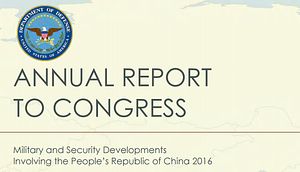China has strongly protested a recent U.S. Department of Defense report on its military, describing it as inaccurate. On Friday, the Pentagon released its annual report to Congress on developments in the Chinese military; this year’s analysis focused heavily on the People’s Liberation Army’s activities in the South China Sea, where China has built seven artificial islands.
During the launch of the report on Friday, Deputy Assistant Secretary of Defense for East Asia Abraham M. Denmark described the “unprofessional” activities of China’s Coast Guard and fishing vessels. Denmark added that China’s “activities are designed to stay below the threshold of conflict,” highlighting Beijing’s use of so-called gray zone tactics.
Yang Yujun, a spokesperson for the Chinese Ministry of Defense, stated China’s “strong dissatisfaction” and “firm opposition” to the Pentagon’s report. He claimed that it “deliberately distorted” China’s defense policy. “China follows a national defense policy that is defensive in nature. Moves such as deepening military reforms and the military buildup are aimed at maintaining sovereignty, security and territorial integrity, and guaranteeing China’s peaceful development,” Yang added.
As tensions have built up in the South China Sea, Beijing has regularly accused the United States of raising tensions and “militarizing” the area. Though China has placed fighters and missile batteries on Woody Island in the Paracel Islands, for example, it continues to see U.S. Navy activities, including the United States’ freedom of navigation operations, as a form of militarization.
Along these lines, Yang, paraphrased by Xinhua, pointed out out that U.S. moves in the South China Sea “pushed forward the militarization in the South China Sea with an intention to exert hegemony.” Finally, the Chinese spokesman noted that the report had “severely damaged mutual trust between the two sides.”
Tensions stemming from the release of the report may have been exacerbated by a recent freedom of navigation operation in the South China Sea last week, when the USS William P. Lawrence sailed within 12 nautical miles of Fiery Cross Reef, a China-held feature that has been built into an artificial island with a 3,000 meter airstrip.
The Pentagon’s report was clear in its evaluation of the military utility of China’s artificial islands. “Although artificial islands do not provide China with any additional territorial or maritime rights within the South China Sea, China will be able to use its reclaimed features as persistent civil-military bases to enhance its presence in the South China Sea significantly and enhance China’s ability to control the features and nearby maritime space,” the report said.

































